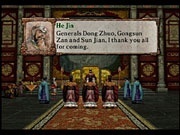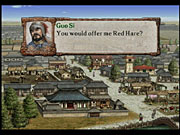It's been just about a year since the last Romance of the Three Kingdoms game came out, so it must be time for another one. Indeed, the eighth incarnation of Koei's long-lived strategy series is upon us, and as you probably expected, it brings back the tried-and-true formula used by previous versions for yet another go. Romance of the Three Kingdoms VIII attempts to make the strategizing a little more personal by incorporating more dramatic cutscenes and a new character relationship system that tracks who hates whom or which officer has married which maiden. The game makes a few other mechanical additions, but this is fundamentally the same strategy game you've been playing for years. Romance of the Three Kingdoms VIII won't win any new converts to the strategy genre, but it's a good game that ought to please devotees of the series.

Koei releases so many games based on the "three kingdoms" period of ancient Chinese history that describing this scenario in reviews has become a matter of rote recitation. You may be aware of the novel titled Romance of the Three Kingdoms (yes, just like the game), which chronicles the turmoil that occurred in third-century China after the fall of the Han dynasty. For decades, the three powerful kingdoms of the book's title--Wu, Wei, and Shu--vied politically and militarily for dominance, and it's this hostile climate in which Romance of the Three Kingdoms VIII (like all previous games before it) is set. You can play as a member of any of the three kingdoms and start your game during any year and in the midst of any scenario from the period. No matter the circumstances, ultimate victory consists of the unification of China. There are a huge number of scenarios, many of them historical, and they determine which territories are owned by whom, who is alive and who's dead, and a variety of other circumstances. This provides a whole lot of replay value; if you're inclined to play the game dozens of times, you'll never do it the same way twice.
As in previous games, you begin Romance of the Three Kingdoms VIII by selecting an officer. Actually, now you can select several--in the past, you played as only one character throughout a campaign, but this game lets you pick up to eight to play simultaneously. The game features a stupidly huge roster of more than 700 officers that can be categorized by rank, political affiliation, city, or a variety of other criteria. Many of these officers are actual historical figures, and of course you can always create your own character if none of the provided ones are exactly to your liking. As before, the officer you choose will occupy a variety of ranks, and his rank at the outset will determine his sphere of influence and the kinds of actions he can take. In addition to the five ranks (ronin, general, prefect, warlord, and ruler) seen in previous games, there are three new ones: governor, which is a rank between warlord and prefect; chief, a ruler who has an army but no city; and comrade, who serves under a chief. These new classes bring some more variety to the gameplay, which strategy aficionados will appreciate, but they don't drastically alter the play experience.
As fans of this series are well aware, the core gameplay in Romance of the Three Kingdoms VIII is driven by text menus, numbers, and a lot of Chinese names. The progress of your faction is charted by months, and each month you'll have a certain number of actions--again, determined by your rank--that you can take to strengthen your own position or undermine that of your foes. The number of things you can do in a turn is almost overwhelming. As an example, you can send a gift to an allied kingdom to increase your influence with its leaders, you can conscript more citizens to bolster the ranks of your army, or you can send a spy to gather information about a city you plan to invade. There are a ton of stats and figures to track, from hard assets like gold to less tangible numbers like your fame or friendliness. It can also be a little difficult to keep up with all of the cities and characters in the game, unless you happen to speak Chinese--many of the officers have the same surnames, for instance. Thankfully, an extensive online help mode is always available, so with enough diligence and attention to detail, even inexperienced-but-determined players should be able to make sense of things.

If you hoped part eight would be the game that brought the Romance series visually up to date, you'll be sorely disappointed--this game is as graphically simplistic as the last one. Presumably, the school of thought here is that graphics don't automatically make a great game, and furthermore, the kind of gameplay in this series operates just fine without even remotely impressive graphics. Technically, that's true--Romance VIII plays fine while looking like a higher-resolution Super NES game. But couldn't Koei have thrown a little more effort into the game's visual presentation? Even a small degree of graphical fluff would've helped give the impression that this series is truly moving into the next generation of gaming along with the other genres, since the gameplay certainly doesn't. At least this game's music, like last year's, is higher quality than you'd expect--it's well composed and appropriate to the setting, and it manages not to become tiresome even when you've heard a lot of it (and you will).
Let's be realistic here: If Romance of the Three Kingdoms VIII is your kind of game, you don't need this review to tell you to go out and get it. Fans of this kind of intensely complicated strategy game who for some reason haven't given it a look should definitely do so, since it does bring enough new features to the table to warrant a whole new game. If you're dead set against this sort of plodding, number-driven gameplay, though, there's absolutely nothing here to win you over. In short, Romance of the Three Kingdoms VIII is built for a select group of gamers. Koei knows its audience for this series, and it's certainly playing to them, and that, at least, is commendable.